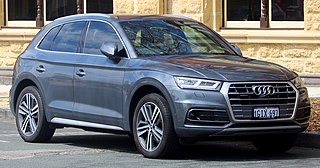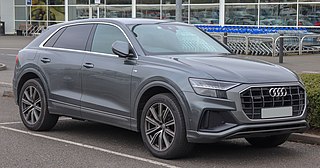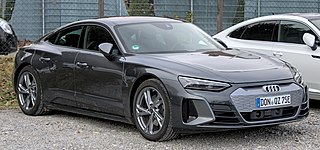
The Audi A3 is a subcompact executive/small family car (C-segment) manufactured and marketed by the German automaker Audi AG since September 1996, currently in its fourth generation.

The Audi Q7 is a mid-size luxury crossover SUV made by the German manufacturer Audi, unveiled in September 2005 at the Frankfurt Motor Show. Production of this seven-seater SUV began in the autumn of 2005 at the Volkswagen Bratislava Plant in Bratislava, Slovakia. It was the first SUV offering from Audi and went on sale in 2006. Later, Audi's second SUV, the Q5, was unveiled as a 2009 model. Audi has since unveiled a third SUV model, the Q3, which went on sale in the third quarter of 2011, and a fourth SUV model, the Q2, which went on sale in November 2016. The Q7 shares a Volkswagen Group MLB platform and chassis with the Bentley Bentayga, Lamborghini Urus, Porsche Cayenne and the Volkswagen Touareg.

The Audi Q5 is a series of compact luxury crossover SUVs produced by the German luxury car manufacturer Audi from 2008. The original first-generation model was the third member of the B8 family to be released after the Audi A5 and fourth-generation A4, all being based on the Audi MLB platform. The second generation Q5 debuted in 2016 and shares the Audi MLB Evo platform with the corresponding B9 versions of the A4 and A5.

The Audi Q3 is a subcompact luxury crossover SUV made by Audi. The Q3 has a transverse-mounted front engine, and entered production in 2011.

The Audi A1 is a supermini car launched by Audi at the 2010 Geneva Motor Show. Sales of the initial three-door A1 model started in Germany in August 2010, with the United Kingdom following in November 2010. A five-door version, called Sportback, was launched in November 2011, with sales starting in export markets during spring 2012.

The Audi e-tron is a series of electric and hybrid cars shown by Audi from 2009 onwards. In 2012 Audi unveiled a plug-in hybrid version, the A3 Sportback e-tron, released to retail customers in Europe in August 2014, and slated for the U.S. in 2015. A decade after the unveiling of the first e-tron concept at the 2009 International Motor Show Germany, Audi's first fully electric e-tron SUV went into production in 2019.

Audi hybrid vehicles are hybrid electric vehicles created by the German carmaker, Audi. Some vehicles listed were concept vehicles, which utilised an internal combustion engine and an electric motor, and were used for research and development (R&D) for potential future use of the technology into possible series production. Audi launched its first hybrid concept car in 1989 called the Audi Duo, and was the first European company to sell a hybrid in 1997, though only in very small numbers.

The Porsche Taycan is a battery electric saloon and shooting brake produced by German automobile manufacturer Porsche. The concept version of the Taycan, named the Porsche Mission E, debuted at the 2015 Frankfurt Motor Show. The Taycan was revealed fully production-ready at the 2019 Frankfurt Motor Show. As Porsche's first series production electric car, it is sold in several variants at different performance levels, and may spawn further derivatives in future models. More than 20,000 Taycans were delivered in 2020, its debut sale year, representing 7.4% of the total Porsche volume. A modified Taycan Turbo S is the current Formula E Safety car.

The Jaguar I-Pace is a battery-electric crossover SUV produced by Jaguar Land Rover (JLR) under their Jaguar marque. The I-Pace was announced in March 2018, European deliveries began in June 2018 and North American deliveries started in October 2018.

Mercedes-EQ is a series of battery electric vehicles manufactured by Mercedes-Benz. The first model was previewed at the Paris Motor Show in 2016 with the Generation EQ concept vehicle. Mercedes-Benz intends to produce ten EQ models by 2022, three of which will have the Smart brand, representing between 15% and 25% of the company's global sales. All of Mercedes-Benz electric vehicle design and production efforts will target the EQ family.

The Audi Q8 is a mid-size luxury crossover SUV coupé made by Audi that was launched in 2018. It is the flagship of the Audi SUV line, and is being produced at the Volkswagen Bratislava Plant.

The Byton M-Byte was an all-electric battery-powered SUV 2018 concept car from Byton.

The Volkswagen Group MEB platform is a modular car platform for electric cars developed by the Volkswagen Group and its subsidiaries. It is used in models of Audi, SEAT, Škoda and Volkswagen. The architecture is aimed to "consolidate electronic controls and reduce the number of microprocessors, advance the application of new driver-assistance technology and somewhat alter the way cars are built" by the VW Group.

The Rising Auto Marvel R and its predecessor, the Roewe Marvel X, are electric compact crossover SUVs manufactured by the Chinese manufacturer SAIC Group under the Roewe brand. The Roewe Marvel X was launched in 2018 and is positioned above the Roewe RX5, and below the Roewe RX8. Its successor is the 2021 Roewe Marvel R, which is going to be sold in Europe as the MG Marvel R.

The Audi Q4 e-tron is a battery electric compact luxury crossover SUV produced by Audi. It is based on Volkswagen Group's electric MEB platform and is the fourth fully-electric model in the Audi e-tron series after the Audi e-tron, e-tron GT and Q2L e-tron. Production began in March 2021, with the production version being unveiled in April 2021.

The Ford Mustang Mach-E is a battery electric compact crossover SUV produced by Ford. The vehicle was introduced on November 17, 2019, and went on sale in December 2020 as a 2021 model. The vehicle uses the Mustang nameplate, with a Mach-E moniker which is inspired by the Mach 1 variant of the first-generation Mustang. The car won the 2021 North American SUV of the Year Award.

The Aiways U5 is an all-electric battery-powered compact crossover SUV manufactured by the Chinese company Aiways. It is the first vehicle model from this manufacturer. The production model of the U5 was publicly unveiled at the 2018 Beijing Auto Show. The car was originally previewed as the Aiways U5 ion Concept in 2018.

The Volkswagen ID.4 and Volkswagen ID.5 are battery electric compact crossover SUVs produced by Volkswagen. Based on the MEB platform, the ID.4 is the second model of the Volkswagen ID. series. The production version of the ID.4 debuted in September 2020 as the first fully-electric crossover SUV under the Volkswagen brand, while the coupe-shaped variant of the ID.4 is marketed as the Volkswagen ID.5 and was revealed in November 2021.

The Audi e-tron GT is a battery electric executive car produced by Audi since late 2020 as part of the e-tron battery electric sub-brand, and the third fully electric car model, after e-tron and e-tron Sportback SUVs. Based on the J1 platform shared with the Porsche Taycan, the car went on sale in March 2021.
























